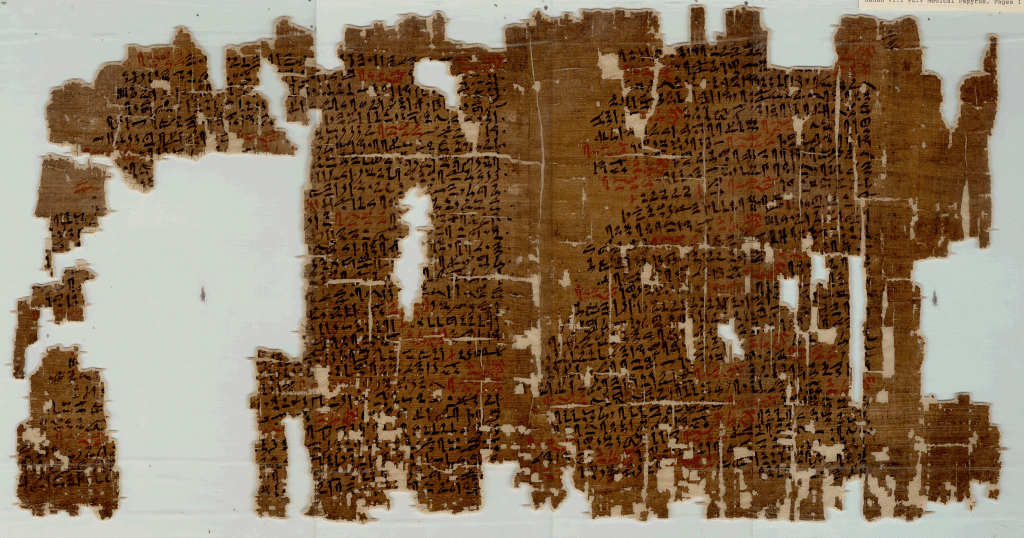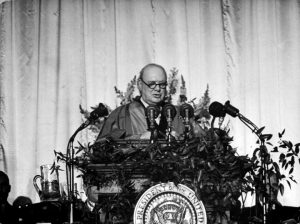Winner of the Fall 2017 StMU History Media Award for
Best Article in the Category of “Gender Studies”
Best Overall Research
For most of modern memory, the predominant belief was that sex was for procreation, and that pleasure was a sin.1 As a result, members of modern society tend to assume that contraception is a fairly recent practice. Yet, contrary to popular belief, many ancient societies believed in sex for pleasure. For instance, some of the earliest medical writings show contraception played a role in Egyptian society.2 Some question the efficacy of the contraceptive techniques as another method of suggesting that sex for pleasure was not historically possible. But there is little doubt that the reason for the Egyptians’ seeking effective contraception was to permit sex without the concern of procreation, hence sex solely for pleasure. Indeed, sources like the Kahun Papyrus show us that our ancient and pre-modern ancestors knew a good deal about reproduction and effective contraception—proving that Egyptian women had more control over their sexuality in ancient times than many woman have enjoyed since the rise of modern religions.3
The main source of historical evidence that contributes to this debate between contraception and infant mortality, and between magic and medicine, is the Kahun Gynecological Papyrus.4 The Kahun Papyrus was discovered by Petrie Flinders in 1889 in a small village called El-Lahun, one-hundred kilometers south-west of Cairo. It dates to 1850 B.C.E., and is the earliest record of ancient Egyptian medical practices. The papyrus is entirely gynecological in nature and is written in hieratic script, not hieroglyphs. It did not become legible until 1806 after the discovery of the Rosetta stone.5 It is divided into thirty-four sections, each dealing with a specific problem relating to gynecological disease, fertility, contraception, and pregnancy. Three of these fragments are prescriptions that relate specifically to preventing conception, all of which involve vaginal suppositories.6 When Flinders found the papyrus, it was badly damaged with small fragments of text missing.7 These missing fragments keep the debate alive as to how exactly some of these remedies were used.
However, despite the long-held belief among scholars that the relative stability of ancient populations was linked to a high infant mortality rate, there is significant evidence that shows that that was not the case.8 The Kahun Papyrus shows us that Egyptian medical practices were based in fact and knowledge, with only a sprinkling of the supernatural. In his book, Contraception and Abortion from the Ancient World to Renaissance, John Riddle, a leading expert of ancient pharmacology, makes the argument that population stability was not linked to high infant mortality rates. Instead, Riddle asserts that population control was due to the use of herbal contraceptives by women.9 The ancient world held much more knowledge of contraceptives than previously thought.10

The main treatments detailed in the papyrus were founded in Egyptians’ knowledge and observations of herbs, plants, minerals, and the effects these items in nature had on animals. The Egyptians noticed that when animals ate certain plants they failed to reproduce. They carried this observation over into their reproductive techniques. Ingredients listed in the contraceptive techniques include acacia gum, sour milk, crocodile dung, fiber, and honey.11 These ingredients were mixed into a pessary and inserted into the vagina by a swnw, or person who was skilled in the art of healing. The pessary would work to block the sperm from reaching a woman’s fallopian tubes and finding an egg to fertilize. When the method using sour milk was tested, the results showed that the enhancement of the acidic environment of the vagina with the introduction of sour milk establishes an effective spermicide, thus proving that the Egyptians did use medicinal techniques that were based on fact, not simply on fiction.12
The existence of contraceptive treatments reflected within the Kahun Papyrus combined with their demonstrated effectiveness leads to the extrapolation that population control was both a desired and achievable outcome for ancient Egyptians. If John Riddle’s theory that the Egyptians actively prevented pregnancy is correct—and the evidence suggests that it is—then we can conclude that sex was not only for reproduction, but for enjoyment.13 In her book Sexual Deviance and Society, Meredith G. F Worthen asserts that sexual imagery from more than 5,000 years ago has been credited to ancient Egyptian cultures. Although we may see these depictions as pornography, to ancient Egyptians they were just a part of sexual life.14 This could lead to the belief that ancient Egyptians were not exactly modest when it came to sexuality and sexual pleasure. To freely express their sexuality, effective contraceptives were a necessity.

Overall, the evidence directs us to the fact that Egyptians held knowledge about contraceptives and used them to prevent pregnancy. So why is the modern belief that contraceptives are a new invention, rather than several millennia old? The answer lies in the rise of Christianity. Before Christianity found its foothold as a highly influential religion, early humans often equated sexual and religious experiences. Christian hostility to sexuality built steadily in the early centuries of the religion. This hostility produced a new attitude of denunciation of women’s sexuality. Early Christians promoted the narrative that Jesus was not born from normal sexual activity, but from a virgin through immaculate conception. Once the religion gained traction, sexual misbehavior was not only seen as a danger to proper human values, but as an offense to God himself. The prevailing belief was that sex was only allowed in marriage and for reproduction. Christian missionaries eventually held enough influence over governments that they pushed them to add new secular penalties to violations of sexual regulations. Secular laws began to target the use of contraception or any other act preventing birth, in some cases the penalty for these acts was death. Over time, Christianity succeeded in chiseling away at “open” sexuality.15 Though modern society has begun to shed this belief, we still see vestiges of it linger in the way sexuality among woman is described. Women who enjoy sex face negative rebukes across the world. These hostile ideologies explain some scholars’ reluctance to accept the fact that ancient Egyptian women enjoyed sex and actively and effectively engaged in it without the outcome of pregnancy.
“Man has always had a desire to heal and control fertility.”16 This truth does not apply only in modern times as many think; the Kahun Papyrus shows that this desire goes all the way back to at least 1825 B.C.E. Yes, the Egyptians’ medical practices were influenced by religion, but we cannot discount their effective techniques simply because they imbibed those practices with the supernatural. Joshua Mark says that “most people would balk at the idea of visiting a doctor and having incantations muttered over them.”17 Yet, we have long had, and still have, very similar rituals in modern Christian society. Doctors will sometimes use their medical knowledge to treat patients, while also praying for or with them. The Kahun Papyrus can be evaluated the same way. We, as a society are reluctant to accept the fact that women are sexual beings, but the historical evidence proves that women have sought control over their sexual experiences since ancient times. That desire is not new to modern society. Steeped in religion though it may be, the papyrus proves our ancient ancestors developed effective techniques for contraception so they would be free to pursue their sexual desires without the fear of procreation.
- Peter N. Stearns, Sexuality in World History (Madison, NY: Routledge, 2009), 47. ↵
- Gary B. Ferngren, “Eve’s Herbs: A History of Contraception and Abortion in the West,” The New England Journal of Medicine 341, (1997): 1398. ↵
- John Riddle, Contraception and Abortion from the Ancient World to the Renaissance (Cambridge, MA: Harvard University Press, 1992), 67. ↵
- Stephen Quirke, Manuscript for the health of mother and child (London: University of London, 2002), 1-3. ↵
- Chinmoy K. Bose, “The el-Lahun gynecological papyrus,” Hekton International: A Journal of Medical Humanities 9, no.2 (2016), http://hekint.org/the-el-lahun-gynecological-papyrus/. ↵
- John Riddle, Contraception and Abortion from the Ancient World to the Renaissance (Cambridge, MA: Harvard University Press, 1992), 66. ↵
- Chinmoy K. Bose, “The el-Lahun gynecological papyrus,” Hekton International: A Journal of Medical Humanities 9, no.2 (2016), http://hekint.org/the-el-lahun-gynecological-papyrus/. ↵
- Gary B. Ferngren, “Eve’s Herbs: A History of Contraception and Abortion in the West,” The New England Journal of Medicine 341, (1997): 1398. ↵
- Gary B. Ferngren, “Eve’s Herbs: A History of Contraception and Abortion in the West,” The New England Journal of Medicine 341, (1997): 1398. ↵
- Ronit Haimov-Kochman, Arye Hurwitz, Yael Sciaky-Tamir, “Reproduction concepts and practices in ancient Egypt mirrored by modern medicine,” European Journal of Obstetrics and Gynecology and Reproductive Biology 123, no. 1 (2005): 3-8. ↵
- Lesley Smith, “The Kahun Gaynaecological Papyrus: ancient Egyptian medicine,” Journal of Family Planning and Reproductive Health Care 37, no.1 (2010): 54–55. ↵
- Ronit Haimov-Kochman, Arye Hurwitz, Yael Sciaky-Tamir, “Reproduction concepts and practices in ancient Egypt mirrored by modern medicine,” European Journal of Obstetrics and Gynecology and Reproductive Biology 123, no. 1 (2005): 4-5. ↵
- John Riddle, Contraception and Abortion from the Ancient World to the Renaissance (Cambridge, MA: Harvard University Press, 1992), 70. ↵
- Meredith G. F. Worthen, Sexual Deviance and Society: A sociological examination (New York: Routledge, 2016), 140. ↵
- Peter N. Stearns, Sexuality In World History (Madison, NY: Routledge, 2009), 43-48. ↵
- Lesley Smith, “The Kahun Gaynaecological Papyrus: ancient Egyptian medicine,” Journal of Family Planning and Reproductive Health Care 37, no.1 (2010): 54–55. ↵
- Ancient History Encyclopedia, February 2017, s.v “Ancient Egyptian Medical Texts,” Joshua J. Mark. ↵



146 comments
Joshua Zemanski
This was a amazing article and it was well deserved of an award. I never would of thought contraceptives went all the way back to Egypt. I wonder how effective they really were or if they hurt the women in anyway like any side effects after using them. The whole article pieced very well together and flowed well and made it easy to follow.
Vanessa Rodriguez
Such a fascinating and compelling article. I found it riveting how the Egyptians would observe what effects certain herbs had on animals and later translated it to be used on women. It demonstrates just how advanced ancient societies were and how contraception was around for way before then we thought. Now in modern times, the rise of christian society makes it seem wrong to use contraception and shames women for having sexual desires. Once again, great article!
Grace Ibarra
Lastly, I think this article wall very well written. At a Catholic Marianist university, there are many students who grew up in the Christian faith and are a part of the generations that were influenced by those were introduced Christianity. This is an important and informative topic that can often put some who may have been dealing with internal conflict at ease, or change the view of someone who, for most of their life, believed that the negative connotation surrounding contraceptives was justified. This article very much deserved the award of best article concerning gender studies.
Emily Rodriguez
This article was very interesting to read! I believe the author did an excellent job of explaining the different practices and uses for contraception during Ancient Egypt. It was highly informative, and descriptive, and covered a lot of information in what felt like such a short article. It had a great flow and kept the reader’s thoughts organized in a way where it was straightforward to read. Great Job!
Yanelle Nicholson
I really enjoyed how the author used an introduction that draws you into the reading. She then proceeds to explain the timeline of when women began the use of contraceptives, making it known that it is not a modern thing. Then the author proceeds to explain how sex for procreation only came about which was from Christianity making us all believe it was always like that in the past and that the world is just changing now. But before Christianity ever existed sex was viewed differently, and women used contraception to make sure it was not done for procreation but for their pleasure. This explanation really put everything into perspective, how we have been taught differently and opens our eyes to reality.
Gabriella Parra
Well-deserved award! Wow! I had never heard of ancient Egyptian contraception before! It’s interesting that contraception was effective with purely natural products. I wonder what the side effects were and how it compares to modern contraceptives. I also wonder if contraceptives were controversial in ancient Egypt, at least when they were first introduced. I definitely want to look further into this.
Victorianna Mejia
Congratulations on the award! It is very well deserved! I loved this article, and I was so excited to read it. It was interesting to read about the Egyptians and their form of birth control. A little disgusting; however, I can appreciate their creative ways of preventing a pregnancy. Women have always gone through a lot in society, and this article proves that women are dedicated to their ways of birth control. Again, this article was great and very, very informative!
Idaly Oropeza
I would like to congratulate Cavanaugh for winning the “Best Article in the Category of “Gender Studies”. I think it was very well deserved, as this article was very clear and precise as far as research. Cavanaugh did an outstanding job using pictures to help the reader visualize the main points of this article. The picture of the man holding the Bible shows the power religion has on the way people view contraceptives, sex and abortion.
Samuel Vega
Mariah, congratulations on your well-researched and written article. Winning the scholar award in two categories is an acknowledgement of your outstanding work on the article. I was not aware of the Kahun Gynecological Papyrus and finding myself agreeing with your premise and methodical explanation of Early Egyptians developing an effective method of contraception which allowed them to pursue their sexual desires.
Robert Miller
I reviewed a couple of the sources for the article to gain more background knowledge about the topic. I had zero knowledge about the sexual practices of the Egyptians during the 1800s BCE. What really struck my attention was the statement in the article that for most of modern history the predominant belief was that sex was for procreation and pleasure was a sin. I wasn’t sure that statement still applies today. The first source was very clarifying and I have a better understanding now.